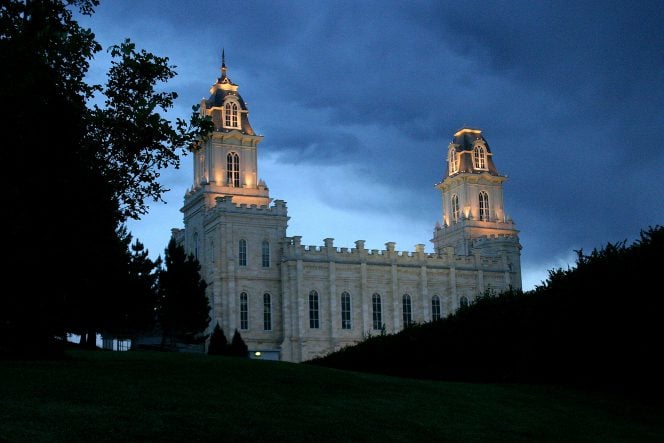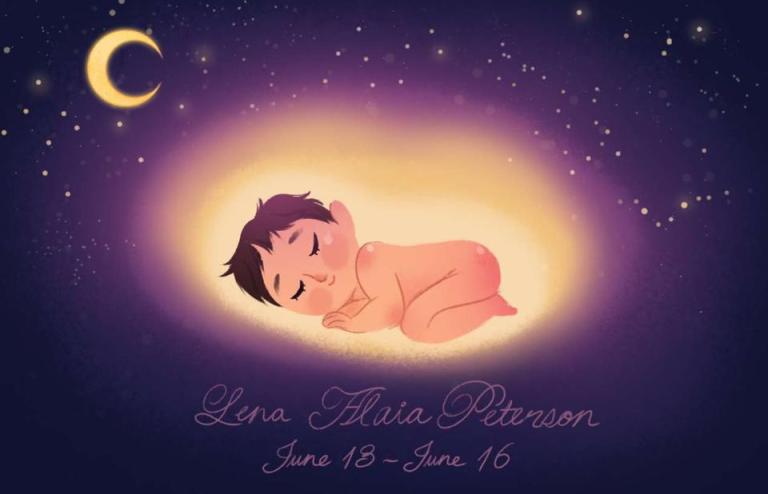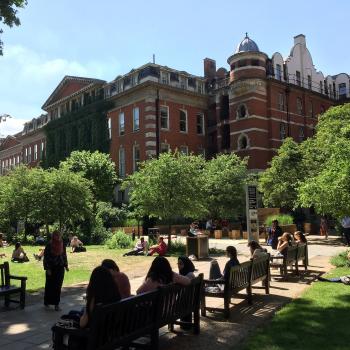
Six years ago today, on 13 June 2014, our first grandchild was born in Orlando, Florida.
She was born in a wing of a local Orlando hospital that had been built with generous Disney donations, and the hospital’s public spaces were decorated everywhere with characters from Disney cartoons. As it rapidly became obvious that Lena would not, and could not, survive, I became acutely aware of how much I had looked forward to one day introducing her to those characters via beloved movies and in the nearby Disney theme parks. I was surprised. I grew up essentially an only child, with just a ten-year-older half brother; I haven’t been around little kids a lot, and I’m not especially good with them. I hadn’t even realized that I was eagerly anticipating and imagining such a privilege.
These days were, by a considerable distance, some of the worst of our lives. If we could have spared our son and his wife this terrible grief, we would gladly have done so. As it was, there was essentially nothing that we could do to help them or to take the burden from them, and that inability to help made the pain even deeper. To watch our children in pain, to see them go from joyful anticipation to stunning loss, was truly agonizing.
But time passes, and wounds heal. Not completely, but more or less.
Lena’s stay with us was so very brief that I’ve feared that I might forget her. So, among other things, I’ve vowed to mark her birthday and the day of her death each year, until I no longer can, with blog entries about her.
I won’t allow her to have passed unnoticed. Most of all, I myself refuse to forget her. I am her grandfather. I will miss her and I will mourn her until, someday, I meet her again.

This is the column, written literally and quite uncharacteristically through agonized sobs, that I published in the Deseret News when she died:
Some are displeased with The Church of Jesus Christ of Latter-day Saints over socio-political disputes, gender concerns and other perceived grievances. While I seldom if ever share their specific issues, I don’t discount them. I know they can hurt.
However, compared with ultimate questions of life and death, they seem thin, even trivial. If the LDS Church’s claims are true — which I believe — everything else is at most secondary.
I echo the apostle Peter’s declaration, when some were offended by the Savior’s teaching:
“From that time many of his disciples went back, and walked no more with him. Then said Jesus unto the twelve, Will ye also go away? Then Simon Peter answered him, Lord, to whom shall we go? thou hast the words of eternal life. And we believe and are sure that thou art that Christ, the Son of the living God” (see John 6:66-69).
On a wintry Utah night decades ago, President Harold B. Lee and a local church leader paused, gazing through snow and darkness toward the Manti Utah Temple, high on the hill above them. “That temple,” the local man observed, “lighted as it is, is never more beautiful than in a storm or when there is a dense fog.” President Lee made the application: “Never is the gospel of Jesus Christ more important to you,” he said, “than in a storm or when you are having great difficulty” (see “Teachings of the Presidents of the Church: Harold B. Lee”).
Mortality offers happiness and sweet satisfactions, but also deep disappointments, intimidating obstacles and — sometimes — almost unbearable sorrows that pierce like a knife.
Among the sharpest such sorrows is the loss of a child. When excited thoughts of baby clothes, crib, stroller, anticipated first books and a cheerfully waiting nursery are displaced by funeral preparations, those things remain — but now, they mock and wound. The world is suddenly desolate. Joy turns to ashes.
A passage from T. S. Eliot’s “Journey of the Magi” comes to mind, however misapplied:
“… Were we led all that way for
Birth or Death? There was a birth, certainly
We had evidence and no doubt. I had seen birth and death,
But had thought they were different; this birth was
Hard and bitter agony for us, like death, our death.”
But God be praised: The birth that the Magi came to honor was the birth that would end death. “One short sleep past,” said John Donne, “we wake eternally, and death shall be no more; death, thou shalt die.”
Naturally, we grieve. Even knowing what he knew and what he would soon do, the Savior himself mourned the death of his friend Lazarus: “Jesus wept. Then said the Jews, Behold how he loved him!” (see John 11:35-36).
“But I would not have you to be ignorant, brethren,” wrote the apostle Paul, “concerning them which are asleep, that ye sorrow not, even as others which have no hope” (see 1 Thessalonians 4:13).
“Thou shalt live together in love, insomuch that thou shalt weep for the loss of them that die, and more especially for those that have not hope of a glorious resurrection. And it shall come to pass that those that die in me shall not taste of death, for it shall be sweet unto them” (Doctrine and Covenants 42:45-46).
Surely death is sweet for tiny infants who scarcely draw breath in mortality. Surely they will enjoy a glorious resurrection. “Little children are alive in Christ,” insisted the prophet Mormon, “even from the foundation of the world” (see Moroni 8:12).
Decades ago, a simple sentence in an LDS Church magazine article deeply impressed me. Sad at parting from co-workers after intense days together at the Hill Cumorah Pageant, a volunteer remarked that the pain was less acute because “friends in the gospel never meet for the last time.”
That comment has remained with me ever since. I believed it then; I believe it now. And yes, I desperately want it to be true.
“All your losses will be made up to you in the resurrection,” testified Joseph Smith in a passage that I’ve needed to cite too often in these columns, “provided you continue faithful. By the vision of the Almighty I have seen it.”
Lena Alaia, our long hoped-for first grandchild, was born on June 13 and died on June 16. In Canadian songwiter Craig Cardiff’s words, “We said hello at the same time we said goodbye.”
We’ve wrapped her in the blanket that we brought from Bethlehem for her crib, entrusting her to the Savior who was born there. He loved little children.
Knowing of our loss and our heartache, a friend (Greg Smith, of Alberta) brought Craig Cardiff’s achingly sad song “Smallest Wingless” to my attention. It’s the source of the quoted line above: “We said hello at the same time we said goodbye.”
I watched this music video of “Smallest Wingless” dozens of times over the next few days. And — I’ve just verified my suspicion experimentally — even six years later I, who never cry, still can’t listen to thirty seconds of the song without breaking down.












